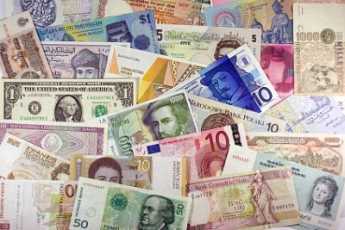Related Topics
American Finance After Robert Morris
Robert Morris can be fairly said to have made the American Revolution possible.
Euros and Dollars

|
| International Money |
The United States government issues lots of different currencies. We issue ones, and twos and fives and tens and twenties. If you need more one dollar bills, you can walk into any candy shop with a five and the shopkeeper will more or less cheerfully make the exchange without charge. But if you want to change the same five dollar bill for euros, yen or drachma, you need to find an agent in a kiosk and pay a fee of about 3%. The booth or shop of the international money changer will have some sort of electronic means to tell what the rate of exchange might be at any given moment. To extend this idea, if the people at the mint run short of ones, they just print some more, meanwhile removing a comparable number of surplus fives from circulation. No matter how extreme the imbalance, it does not affect the price of dollar bills. That's more or less the idea behind the common currency in Europe and a major success. All countries of Europe want to join, nobody wants to leave.
But some things are lost in this obvious simplification of financial transactions; it has enemies. For one thing, the Federal Reserve or other central bankers can change interest rates instantly, but the rest of the economy has a certain amount of inertia. For example, banks typically deal in 90 day Treasury bills, so it takes them a month or two to catch up with the Federal Reserve as the old bills mature; in the meantime, they lose money. Almost all businesses have even longer legs than that. So during the lag periods, the national economy experiences inflation or deflation, which may represent the national interest at the moment, but in time things catch up and rebalance about the way they were before the central bank acted. Except for taxes, that is, and this specific attrition is one of the main arguments for eliminating the capital gains tax, or extending special allowances for banks and others who have short-term gains on price changes without effect on underlying values. The matter gets mixed up in domestic politics. Incumbents long for short-term inflation, nonincumbent challengers denounce it. Everybody welcomes a "strong" currency, everyone recognizes that a weak currency sounds pretty bad. Few, however, could defend their opinion. The people who benefit are the ones who can move fast, because there's usually a brief flurry of inflation or deflation, and then things go backward. People who can move huge amounts of money quickly are apt to make big mistakes in their hurry.
And so it is in the eyes of foreigners. Right now, the American tourist to Paris confronts a taxi charge of $120 for a twenty-minute ride from the airport to the downtown. Everything else, from thirty dollars continental breakfast to two hundred dollar dinners, seems comparably overpriced. Tourists with sticker shock return home to tell their friends all about it, just before the November elections. No doubt it has an opposite effect on Parisian shopkeepers and their acquaintances. But the tourist trade is comparatively minor, compared with major industries. Airbus was once giving Boeing a seriously competitive race for airliners, but now Airbus is contemplating possible bankruptcy if currencies do not soon readjust, and Boeing is laughing all the way to the bank. Stop a minute and consider what happens when you buy and sell a whole company. Now it's the reverse, and a group of European investors is considering buying Anheuser Busch, the largest American brewery. The producer of Budweiser beer seems extremely cheap to Europeans, just as the beer itself is cheap for European beer drinkers. And then just consider a personal note: the wife of Senator McCain, running for President, owns a huge chunk of Budweiser distribution. The pillow talk in that family is likely to focus on the unfairness of hostile foreign take-overs.
So, all in all, tinkering with the currency as a direct or indirect consequence of a banking crisis caused by overbuilding houses in the sunbelt, has potentially fearsome consequences. They must be added to effects on commodity prices, and revolutions in the banking system. Those two issues are next to be considered.
Originally published: Saturday, May 24, 2008; most-recently modified: Wednesday, June 05, 2019